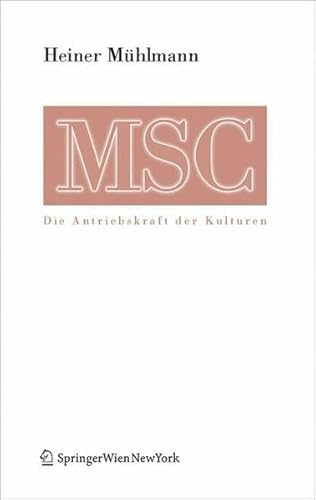Artículos relacionados a Msc Maximal Stress Cooperation

"Sobre este título" puede pertenecer a otra edición de este libro.
- EditorialSpringer Verlag
- Año de publicación2005
- ISBN 10 3211252932
- ISBN 13 9783211252932
- EncuadernaciónTapa blanda
- Valoración
Gastos de envío:
EUR 29,95
De Alemania a Estados Unidos de America
Los mejores resultados en AbeBooks
MSC Maximal Stress Cooperation. Die Antriebskraft der Kulturen von Heiner Mühlmann
Descripción Softcover. Condición: gut. 2005. Der Stoff, aus dem die Kulturen sind? Die Beschwörungsformel für kulturellen Erfolg und kulturelles Desaster? Oder eine systemtheoretische Methode für die Erklärung der kulturellen Evolution? MSC beschreibt den Stress, der Populationen heimsucht, wenn sie sich gegen imaginäre und reale Feinde wehren. MSC beschreibt das Glücksgefühl, das Populationen empfinden, wenn sie glauben, noch einmal davon gekommen zu sein. MSC beschreibt auch das Genie, mit dem Populationen ihre Welten bauen. Autor: HEINER MÜHLMANN, Studium der Kunstgeschichte und Philosophie in Köln, Paris, Rom und München. Zahlreiche Professuren, u. a. in Münster und Paris. Derzeit Professur an der Hochschule für Gestaltung und Kunst Zürich sowie Inhaber des Lehrstuhls für Ästhetik und Rhetorik an der Universität Wuppertal. Autor zahlreicher Buch- und Zeitschriftenpublikationen. The stuff cultures are made of? An invocation for cultural success and cultural disaster? Or a systems-theory method to explain cultural evolution? "MSC" describes the stress afflicting populations in the process of defending themselves against imaginary or real enemies. "MSC" describes the euphoria felt by populations when they believe that they have been let off once again. "MSC" also describes the genius populations show in constructing their different worlds. Muhlmann's Brilliant Theory of Culture Formation Heiner Muhlmann's Maximal Stress Cooperation theory states that cultures are formed largely as the response to actual or perceived threats to a society, threats which create spheres of cooperation amongst a specific population. The greater the emotional content of the stress, the more likely that that event will be retained as a cultural memory that will then be passed down through the generations. Cultures, according to Muhlmann, originate through founding events, such as in the case of the death of a religious martyr. He points out how Christianity begins with the death of Christ and that those who were present at the crucifixion, the two Marys and John, experienced the stress of the event as acute stimuli. The event is then passed along by writing down the Gospels, in which the stimuli are reduced in power to latent stimuli. At this point, the event is portable and can be passed along through media to subsequent generations who are able to translate the latent stimuli in the texts back into their original acute stimuli through the practice of ritual and liturgy which reactivate the original emotions associated with the event. Thus, enculturated traits are passed down through the generations vertically, as it were. Cities reflect the mnemotechnics of stress events by differentiating a sphere of cooperation on the concavities inside the traditional city from a sphere of conflict beyond the convexities of the surrounding wall beyond. The typical transversal type of city is laid out mnemeotechnically so that founding events or stressful events are associated with parades and festivals at certain topoi within the cities. But in the case of modern cities, Muhlmann points out that with the vanishing of walls, our cities are completely open, and as result security comes from electronic signals which saturate the spaces of these cities with a cybersphere of locks and surveillance. Cyberspheres have become strategic spaces that are interpenetrated with game spaces. Drones, terrorist attacks and such phenomena as flash mobs can materialize out of the cybersphere and enter into the spaces of any of these cities in an "immersive" fashion. This is to be contrasted with the Roman gladiatorial arenas, in which a miniaturization of the transversal model of the city had the effect of reproducing a theater of exception, a sphere of conflict, within the sphere of cooperation inside the city. This served to create a continuous Roman identity through the creation of stressful events that, however, did not pass MSC constructs down through the generations, but rather produced, through the deaths of gladiators, continual acute stimuli that never entered latent states. Roman identity, to a very large degree, depended upon having participated in watching these games. Muhlmann's short book -- it's only 70 pages -- distills his theory beautifully and this book is well worth sitting down and spending the couple of hours it takes to read through it. You won't be disappointed. SEE ALSO MY YOUTUBE VIDEO "HEINER MUHLMANN'S MAXIMAL STRESS COOPERATION THEORY DISCUSSED BY JOHN DAVID EBERT"MSC Maximal Stress Cooperation. Die Antriebskraft der Kulturen Heiner Mühlmann Collège international de philosophie Paris Département Forschung und Entwicklung HGK Zürich MSC kulturelle Evolution Sprache deutsch Einbandart Paperback Geisteswissenschaften Kultur Maximal Stress Cooperation Neuropsychologie ISBN-10 3-211-25293-2 / 3211252932 ISBN-13 978-3-211-25293-2 / 9783211252932 In deutscher Sprache. 100 pages. 20,6 x 13,6 x 0,8 cm. Nº de ref. del artículo: BN5699
MSC Maximal Stress Cooperation: Die Antriebskraft der Kulturen Mühlmann, Heiner
Descripción Condición: gut. Rechnung mit MwSt - Versand aus Deutschland pages. Nº de ref. del artículo: D5T-DHN-B41

